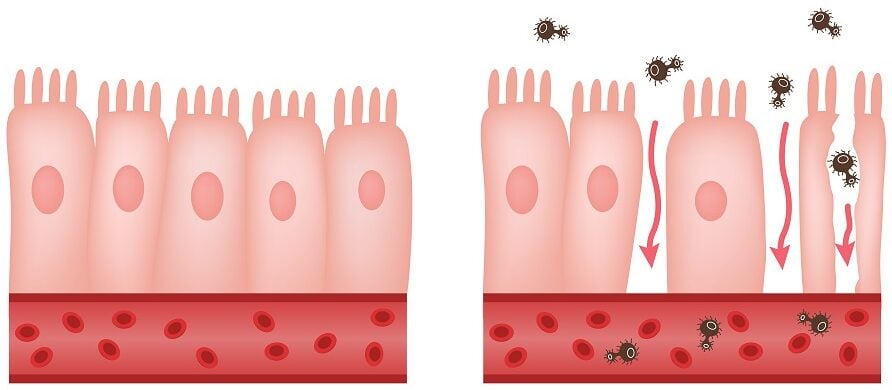
7 Signs You Have Leaky Gut
Leaky gut is an increasingly pervasive health disorder in Western societies. It occurs when the lining of the small intestine becomes excessively permeable (develops “holes”), and as such, leads to the crossover of toxins, negative elements, and undigested food particles into the bloodstream. Once these foreign substances crossover, the immune system attacks them. Eventually, the immune system begins attacking healthy cells in the body, not just the foreign substances, which can lead to many new health concerns.
There are many reasons why an individual may develop a leaky gut. The key contributors to irritation of the gut lining include:
- Alcohol
- Antibiotics
- Caffeine
- Chemical additives
- Foods with antibiotic residues
- Genetically modified organism (GMO) foods
- Glyphosate (an herbicide) – contaminated foods
- Pain medications
- Insecticide-contaminated foods
- Processed foods
- Sugar and refined carbohydrates
Gut inflammation, commonly associated with leaky gut, may negatively affect the body’s ability to produce immunoglobulin A (IgA) as well. Without IgA, pathogens can enter the bloodstream and move throughout the body. This increases the likelihood of an overstimulated immune system, along with the risk that pathogens will reach the liver and prevent the liver from performing its detoxification functions.
Leaky gut frequently goes undiagnosed because many physicians and specialists are unaware of the condition and the symptoms can be vague. Thus, it is paramount for individuals to understand the warning signs, learn all they can, and seek effective treatment.

The warning symptoms of leaky gut include:
- Fatigue: A recent study indicated fatigue may be linked to a person’s intestinal bacteria. In the study, researchers found a leaky gut due to intestinal problems can let negative bacteria into a person’s bloodstream, triggering an immune response that causes fatigue symptoms to develop or worsen.
- Headaches: Build-up of negative elements that have entered the bloodstream from leaky gut in the body may result in headaches.
- Skin Rashes: Oftentimes, skin rashes develop as the body tries to eliminate toxins through skin perforations. If the body is unable to remove toxins, skin rashes may escalate over time.
- Occasional Constipation and Diarrhea: If an individual’s intestinal walls become irritated, he or she may experience occasional constipation and diarrhea, along with bloating and gas.
- Food Sensitivities: If a person starts to develop food sensitivities, this may be a sign that the body is forming antibodies based on this individual’s diet.
- Nutritional Deficiencies: A person may suffer nutritional deficiencies if his or her body lacks sufficient vitamins and minerals due to improper breakdown of food in the intestines and insufficient nutrient uptake.
- Mood Concerns: Studies have shown that leaky gut is a strong contributor to mood issues.
Whether or not your healthcare provider is knowledgeable about leaky gut, if YOU recognize the symptoms, there are self-care steps you can take to help improve your health. First and foremost is the inclusion of bovine colostrum to help repair your leaky gut.
How Does Bovine Colostrum Help People Address Leaky Gut Symptoms?
Research indicates bovine (cow) colostrum is one of the most effective ways to correct leaky gut. In fact, bovine colostrum features a combination of immune factors and growth factors that help the body balance the gut microbiome and heal the GI lining.
Bovine colostrum contains up to 40 times more immune-modulating factors than human colostrum. These have been shown to accelerate healing and recovery.
Bovine colostrum contains these immune factors:
- Cytokines: Cell signaling molecules that aid in cell communication to improve immune response.
- Immunoglobulins: Glycoprotein molecules created by plasma cells and are known to promote immune health.
- Lactoferrin: A naturally occurring protein found in bodily fluids and milk. The lactoferrin in colostrum has been researched in many clinical trials and is proven to promote a healthy immune system.
- Colostrum Polypeptides (CPs): Small chains of amino acids. The CPs in colostrum help the thymus gland initiate and balance the immune response.
The growth factors in bovine colostrum help repair damage to the intestinal lining and restore gut integrity. Also, they help the body digest food, eliminate waste, produce B vitamins, and support a healthy gut. Growth factors even help normalize the gut ecology (the microbiome) to improve the overall effectiveness of assorted dietary, herbal, homeopathic, and lifestyle treatments.
Powdered bovine colostrum has been shown to be effective for people of all ages. The suggested serving size is two teaspoons combined with 4-6 ounces of plain water at least 20-30 minutes before eating meals and one hour prior to bedtime (wait 2 hours after your last meal). The results of bovine colostrum supplementation usually become apparent within about 30 days. Continued daily use is required to maintain a healthy gut.
For those who experience leaky gut, bovine colostrum may provide a long-term solution. For best results, seek a bovine colostrum which has advanced liposomal delivery. The liposomes help protect the precious bioactives on their journey to the small intestine and shield from the hazards of stomach acid. Most cheap colostrum sold on the market is not liposomal delivery and will not give you the benefits needed to help with leaky gut.
This article was brought to you by Sovereign Laboratories, a world leader in the development of liposomal delivery to maximize the bioavailability of our dietary supplements.Sources:
http://www.healthywomen.org/content/blog-entry/10-signs-you-have-leaky-gut%E2%80%94and-how-heal-it
http://www.health.com/digestive-health/gut-bacteria-may-hold-clues-to-chronic-fatigue-syndrome
https://scdlifestyle.com/2010/03/the-scd-diet-and-leaky-gut-syndrome/
https://www.drweil.com/health-wellness/body-mind-spirit/gastrointestinal/what-is-leaky-gut/
http://ndnr.com/anxietydepressionmental-health/mood-and-leaky-gut/
https://www.news-medical.net/health/What-are-Cytokines.aspx
https://www.thermofisher.com/us/en/home/life-science/antibodies/antibodies-learning-center/antibodies-resource-library/antibody-methods/introduction-immunoglobulins.html
https://www.webmd.com/digestive-disorders/features/leaky-gut-syndrome#1
https://www.webmd.com/digestive-disorders/what-are-probiotics#1



